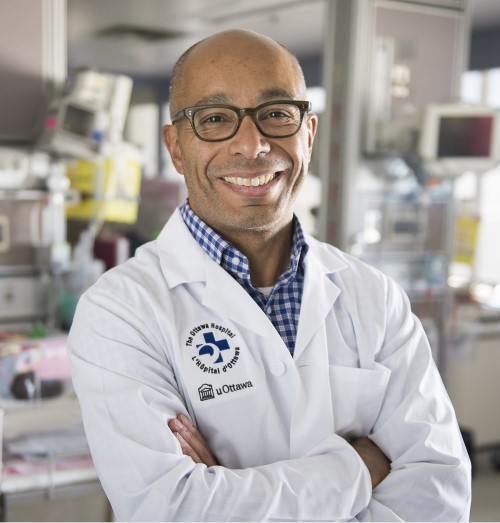 “This is a critical step towards a potential breakthrough therapy that could help premature babies in Canada and around the world.”- Dr. Bernard ThébaudResearchers have treated the first patient in an innovative clinical trial of a cell therapy that aims to prevent very premature babies from developing a chronic lung disease called bronchopulmonary dysplasia (BPD). This is the first trial of its kind in in the world.
“This is a critical step towards a potential breakthrough therapy that could help premature babies in Canada and around the world.”- Dr. Bernard ThébaudResearchers have treated the first patient in an innovative clinical trial of a cell therapy that aims to prevent very premature babies from developing a chronic lung disease called bronchopulmonary dysplasia (BPD). This is the first trial of its kind in in the world.
Very premature babies need extra oxygen and mechanical intervention to breathe, but this damages their lungs, causing BPD. These babies have smaller and weaker lungs that can’t send as much oxygen to their growing brains. The lack of oxygen during brain development can lead to learning disabilities, or problems walking, hearing and seeing. Approximately 1,000 babies in Canada develop BPD every year, and there is no cure or treatment.
Dr. Bernard Thébaud’s team previously discovered that cells from the umbilical cord tissue, called mesenchymal stromal cells (MSCs), can heal lung injury and prevent BPD in newborn rodents. Since then, the team has been working tirelessly to bring this novel therapy to babies and their families through clinical trials.
Partnering with parents of babies with BPD, like Jamie Eberts, has played a key role in helping the researchers understand what information families need to make an informed choice about enrolling their child in this innovative trial.
This Phase I trial will enroll nine babies in the NICU who need at least 30% oxygen while on a breathing machine to get enough oxygen in their blood, which puts them at very high risk of developing BDP. They will be treated with an IV infusion of umbilical cord tissue MSCs grown from donated umbilical cords of healthy newborns.
The goal of this Phase 1 trial is to determine whether the therapy is safe and feasible for premature babies, and to find the best dose for future trials.
Study participants will be recruited from NICUs at The Ottawa Hospital and Sunnybrook Health Sciences Centre, with regular follow-up visits of the Ottawa participants at CHEO.
“This is a critical step towards a potential breakthrough therapy that could help premature babies in Canada and around the world.”- Dr. Bernard Thébaud, a neonatologist and senior scientist at The Ottawa Hospital and CHEO and professor at the University of Ottawa
Core resources: Ottawa Methods Centre, Biotherapeutics Manufacturing Centre, BLUEPRINT Translational Research Group
Funders: This trial is funded by the Stem Cell Network with in-kind matching funds from MDTB Cells GmbH. Dr. Thébaud’s research is also possible because of funding from the Ontario Institute for Regenerative Medicine, the Canadian Institutes of Health Research, The Ottawa Hospital Foundation and the CHEO Foundation.
Dr. Thébaud is a neonatologist and senior scientist in The Ottawa Hospital’s the Regenerative Medicine Program, which includes the Sinclair Centre for Regenerative Medicine and the Sprott Centre for Stem Cell Research. He is also neonatologist and senior scientist at CHEO and holds the uOttawa Partnership Research Chair in Regenerative Medicine. Check out this Q&A and podcast to learn more about what inspires him.
Media Contact
Amelia Buchanan
Senior Communication Specialist
Ottawa Hospital Research Institute
613-297-8315
ambuchanan@ohri.ca
